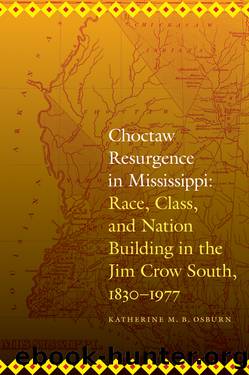Choctaw Resurgence in Mississippi by Katherine M. B. Osburn

Author:Katherine M. B. Osburn [Katherine M. B. Osburn]
Language: eng
Format: epub
Tags: Social Science
ISBN: 9780803240445
Publisher: University of Nebraska Press
Published: 2014-04-22T16:53:07+00:00
8.
Relocation, Resistance, and Civil Rights, 1951â1964
Termination went hand in hand with the relocation program, an effort of the Indian Service to move Indians from isolated reservations to urban areas where employment opportunities were allegedly greater.1 Government officials believed that relocation was the best solution to the Choctawsâ chronic poverty. Most Choctaws, however, shunned relocation as reminiscent of removal. Determined to remain in their homelands, the Choctaw council pursued economic development. This led some councilmen to abandon the Choctawsâ long-standing strategy of racial separatism and seek integration of public schools. For numerous reasons, the Choctawsâ challenges to segregation operated independently of the broader civil rights movement in Mississippi.2 Integration divided the council, for others were hesitant to expose Choctaw children to harassment, and everyone agreed that given the volatility of racial relations, they should proceed carefully. Consequently, Choctaws did not challenge segregation through direct action, but rather asserted their civil rights as Indians not subject to Jim Crow laws.
Choctaw leaders grounded this campaign in the bandâs unique political status as a domestic dependent nation. Their actions ultimately strengthened their sovereignty, for their civil rights activism exposed the role of Mississippiâs racial politics in agency affairs and prompted substantial personnel changes. Choctaw leaders embraced pan-Indianism, which encouraged a new way of framing their political identity. Some councilmen deployed the rhetoric of the Cold War and avowed an American identity based on their Indian citizenship. The Mississippi Choctawsâ attempts to resist termination and relocation in the context of civil rights resulted in a revitalized nation building that is a crucial untold story of Mississippiâs civil rights history.
Removal Revisited: Relocation
Even as they attempted to help Choctaws integrate the local workforce, government officials also concluded in 1952 that âa realistic approach to the economic reorganization of the Mississippi Choctaw Reservation area will require relocation of the majority of those now occupying reservation units.â3 In 1952 three World War II veterans and their familiesâOtis Stoliby, Willie McMillan, and Murphy Solomonârelocated to Chicago. McMillan found a job as a welder and lived at the YMCA. Stoliby secured employment in the International Harvester plant and rented a room with a kitchenette. Within four months, however, Solomon returned to Conehatta because the âChicago pavement was too hard for his feet,â and McMillan fell victim to alcoholism and returned to Mississippi. Stoliby remained, however, and became active in the Chicago Indian community, where he served on the advisory board of the relocation office.4 By the end of 1954, forty-one more families had gone to Chicago and only nine had returned to Mississippi.5
Muskogee Area director W. O. Roberts attributed this success to stories that circulated among Choctaw communities about people like Stoliby. It was not because the council endorsed the program.6 Although the councilman from Bogue Chitto, Prentiss Morris, moved to Chicago in 1953, most council members did not approve of relocation.7 Officers of Relocation Services attended council meetings in 1955 and 1956 in hopes of convincing them otherwise. Several people asked about wages and housing, but were otherwise noncommittal.8
The BIA assigned Glenn Durham as relocation officer for the Choctaw Agency in 1957.
Download
This site does not store any files on its server. We only index and link to content provided by other sites. Please contact the content providers to delete copyright contents if any and email us, we'll remove relevant links or contents immediately.
Cecilia; Or, Memoirs of an Heiress — Volume 1 by Fanny Burney(32531)
Cecilia; Or, Memoirs of an Heiress — Volume 2 by Fanny Burney(31929)
Cecilia; Or, Memoirs of an Heiress — Volume 3 by Fanny Burney(31919)
The Great Music City by Andrea Baker(31905)
We're Going to Need More Wine by Gabrielle Union(19022)
All the Missing Girls by Megan Miranda(15898)
Pimp by Iceberg Slim(14468)
Bombshells: Glamour Girls of a Lifetime by Sullivan Steve(14041)
For the Love of Europe by Rick Steves(13831)
Talking to Strangers by Malcolm Gladwell(13334)
Norse Mythology by Gaiman Neil(13320)
Fifty Shades Freed by E L James(13218)
Mindhunter: Inside the FBI's Elite Serial Crime Unit by John E. Douglas & Mark Olshaker(9301)
Crazy Rich Asians by Kevin Kwan(9263)
The Lost Art of Listening by Michael P. Nichols(7482)
Enlightenment Now: The Case for Reason, Science, Humanism, and Progress by Steven Pinker(7292)
The Four Agreements by Don Miguel Ruiz(6731)
Bad Blood by John Carreyrou(6602)
Weapons of Math Destruction by Cathy O'Neil(6250)
